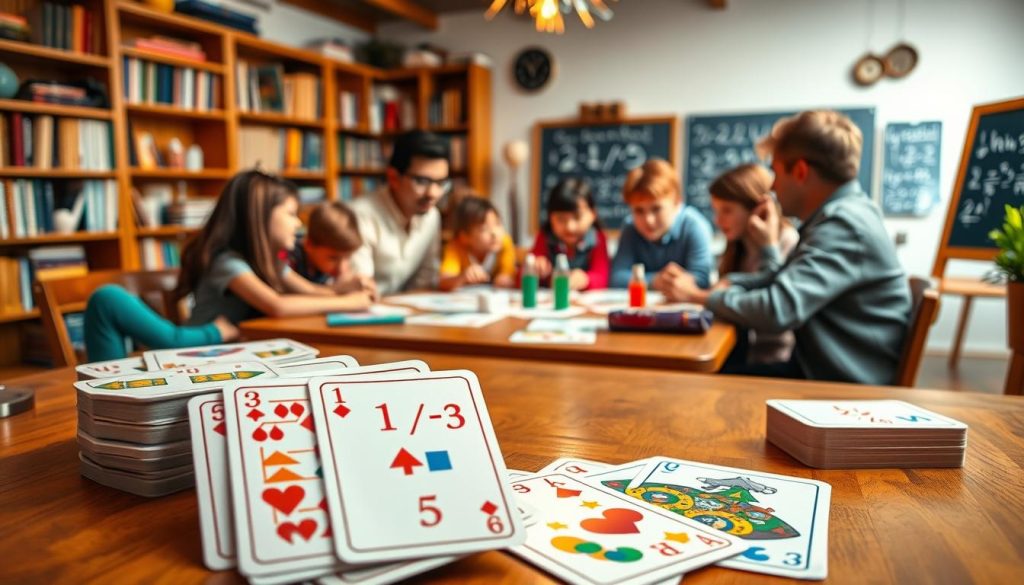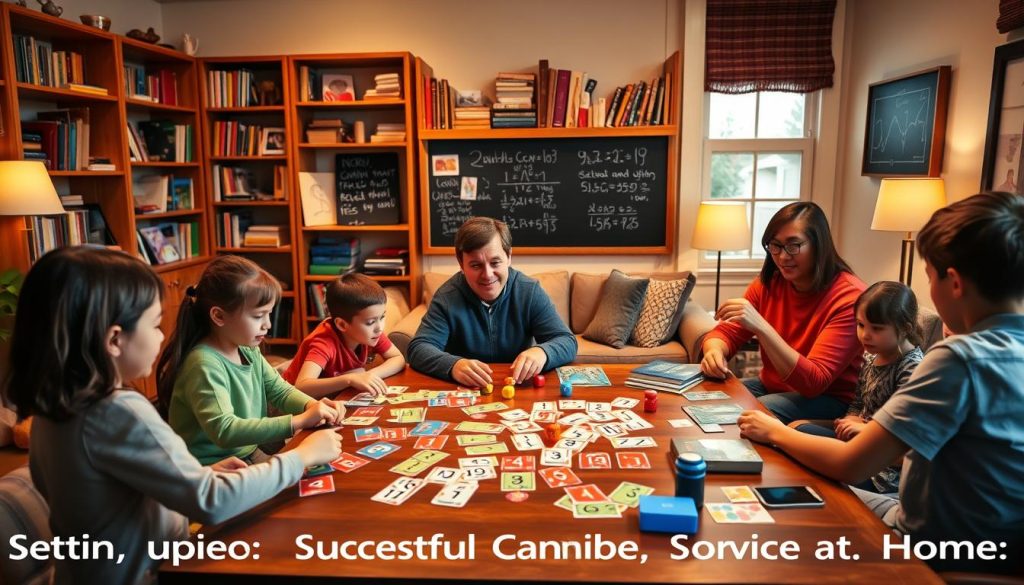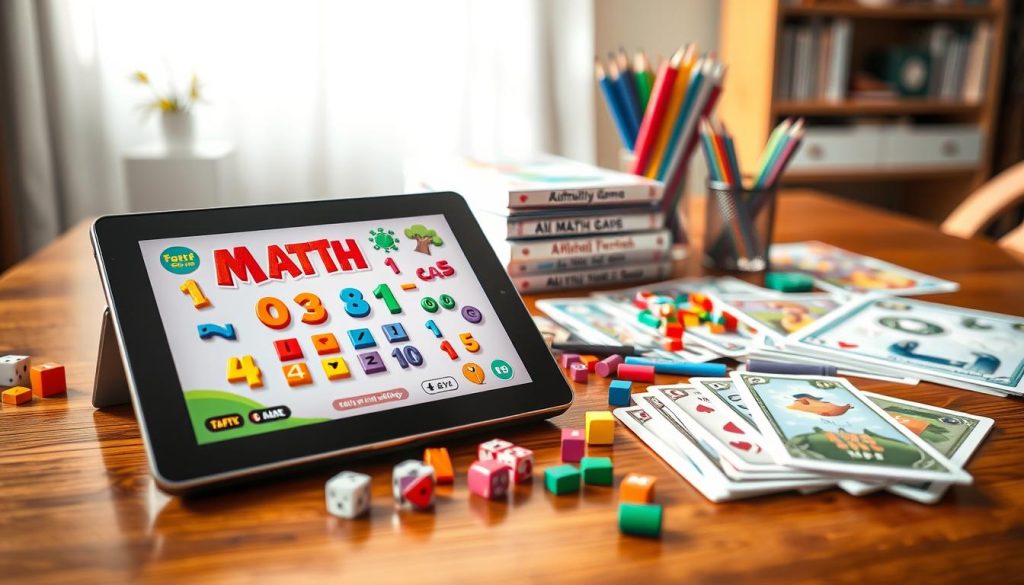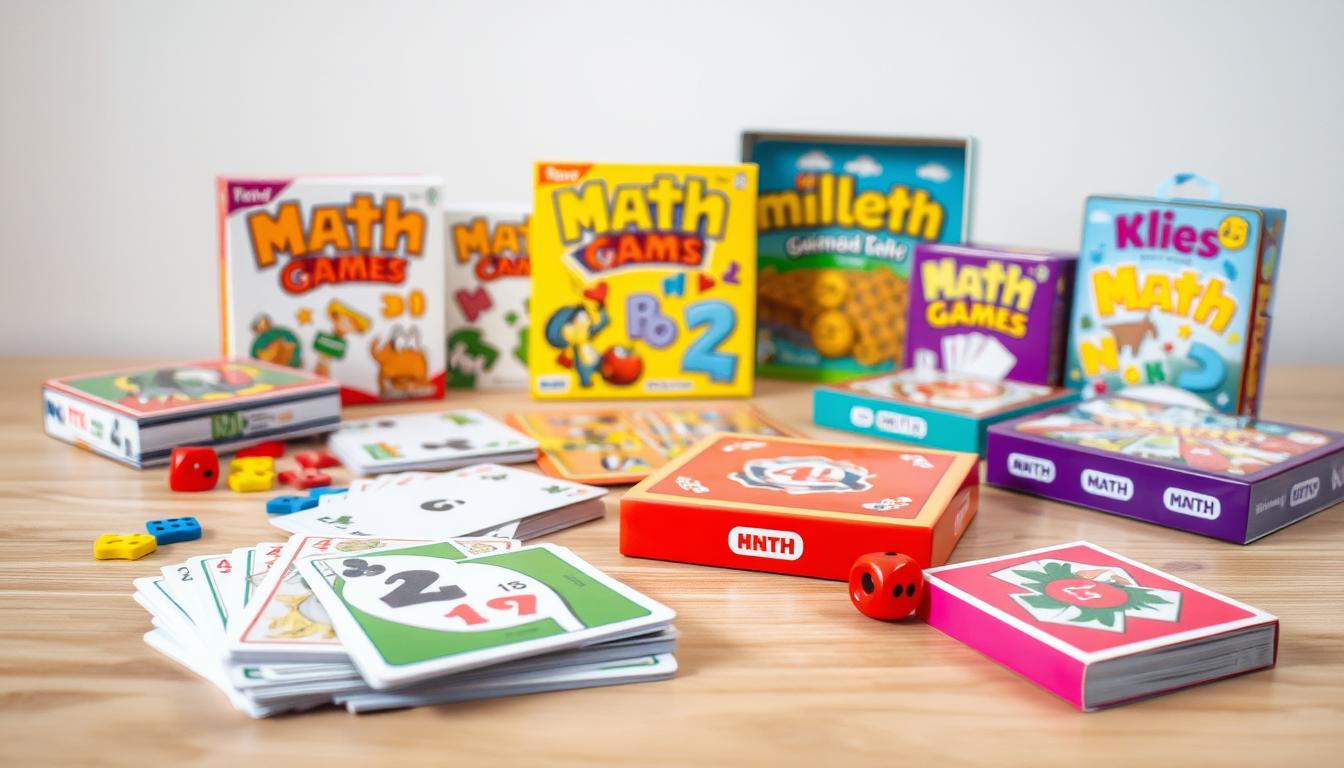Learning math doesn’t have to be boring. Card games make it fun and easy to learn at home. Parents can use regular playing cards to teach math in a fun way.
Educational card games teach math in a fun way. They turn numbers into a game, helping kids think better. This makes learning math a fun challenge, not a hard task.
Card games are great for teaching math because kids love to play. They learn math by playing games that are fun. And the best part? You probably have cards at home to start playing.
Imagine your child laughing while they solve math problems during a game night. With the right games, learning math becomes exciting. These games can make kids curious and confident in math.
Why Card Games Are Powerful Tools for Math Learning
Card games make math fun and exciting. They turn learning into an adventure. Kids can learn important math skills in a fun way.
Math doesn’t have to scare kids. With number sense games, parents and teachers can spark their curiosity. Card games make math easier to understand.
Building Number Sense Through Play
Game-based learning is a great way to learn math. Kids enjoy learning numbers through fun games. This helps them:
- Recognize number patterns
- Understand numerical relationships
- Practice mental calculations
- Develop strategic thinking
The Psychology of Game-Based Learning
Research shows that fun learning works well. When kids are happy, they learn better. Card games make math fun, not scary.
Developing Mathematical Confidence
Winning at math games boosts kids’ confidence. Every win makes them believe they can do more. They start to enjoy learning harder math.
Essential Math Skills Children Learn from Card Games
Card games are great for teaching math to kids. They make learning fun, turning it into an adventure. Kids learn important math skills without feeling like they’re studying.
Playing card games teaches kids basic math concepts in a fun way. These games are interactive. They help kids practice numbers and think strategically.
- Basic Number Recognition: Card games help children quickly identify and compare numbers
- Mental Math Skills: Players learn to perform rapid calculations during gameplay
- Pattern Recognition: Matching and sorting cards develop critical pattern identification skills
- Problem-solving Skills: Strategic card games challenge children to think logically and plan ahead
Different card games focus on different math skills. Simple games help young kids learn about numbers. More complex games improve problem-solving for older kids.
Parents can use these games to make math fun. By making math practice enjoyable, kids become more confident and excited about numbers.
It’s important to pick games that fit a child’s math level. The game should be challenging but not too hard. This keeps kids interested and motivated.
Best Card Games to Teach Math for Different Age Groups
Learning math can be fun with card games. They make numbers exciting for kids. Parents can make math learning fun and engaging.
Every age needs its own math games. Preschool and elementary games help kids think and have fun.
Preschool and Kindergarten Games (Ages 3-5)
Young kids love simple, colorful card games. These games teach counting and recognizing numbers. Some great games are:
- Number Matching Game
- Color and Count
- Simple Memory Cards
Elementary School Options (Ages 6-11)
As kids get older, math games get harder. These games improve math skills and thinking:
- Addition War
- Multiplication Snap
- Prime Number Bingo
Middle School Challenges (Ages 12-14)
Teenagers can handle tougher math with card games. These games boost thinking and problem-solving.
- Algebra Uno
- Probability Poker
- Fraction Matching Challenge
Choosing the right math card games makes learning fun. Kids will look forward to it.
Classic Card Games with Mathematical Benefits

Traditional card games are great for learning math. They turn fun games into math lessons for kids of all ages. Parents and teachers can use these games to teach math in a fun way.
Uno is a favorite game that helps with math. It teaches kids to match numbers and think strategically. The game’s colors and numbers make math fun and exciting.
- Rummy teaches important math skills like:
- Grouping numbers
- Recognizing numerical sequences
- Understanding set theory
- Blackjack helps with probability and quick math
- Solitaire improves planning with numbers
You don’t need special math tools to play these games. Most families already have playing cards. These cards can be used to teach math in a fun way.
The goal is to make math fun and easy to understand. When kids see math as a game, they want to learn more. This makes learning math a natural part of their play.
How to Modify Traditional Card Games for Math Practice
Turning classic card games into math games makes learning fun for kids. These games are a great way to get kids excited about numbers. Parents can make learning fun by adding math challenges to games kids already love.
Parents and teachers can make popular card games better for math skills. They just need to make a few simple changes. This makes learning numbers fun and easy.
Adding Mathematical Elements to Go Fish
Go Fish becomes a fun math game with a few changes:
- Players must add or multiply the numbers on their cards
- Some number combinations get extra points
- Players have to sort cards into math patterns
Transforming Snap into a Numbers Game
The Snap game can be made into a fun math challenge:
- Players must quickly add or subtract when cards match
- Make the game harder with quick math problems
- Introduce rules for prime numbers or even/odd cards
Creating Math Challenges with War
The War game is perfect for adding math challenges. Players can make the game more exciting by using math to win. This makes math practice fun and competitive.
These math games show that learning can be fun. By changing classic games, parents and kids can have fun while learning math together.
Setting Up a Successful Math Card Game Session at Home

Setting up math games at home is easy. Family game nights can turn learning into fun. The trick is to make math seem like a game.
First, pick a good spot for playing math games. A kitchen table or living room floor works well. Make sure it’s quiet and well-lit, and have everything you need ready.
- Pick a consistent time for family game night
- Gather age-appropriate card games
- Create a relaxed, pressure-free atmosphere
- Keep game sessions short (15-30 minutes)
Make math games fun and interactive. Choose games that fit your child’s skill level. Start easy and get harder as they get better. Always praise their effort and thinking, not just if they’re right.
Change up the games to keep things interesting. Some kids like games that need strategy, while others like games of chance. The goal is to keep learning fun.
Be patient with your child. They might need time to get into math games. Stay positive, show you’re excited, and let them learn at their own pace.
Tracking Progress and Celebrating Mathematical Achievement
Playing card games can make learning math exciting. It helps parents see how their child is doing in math. It also keeps kids interested and eager to learn more.
To capture educational achievements, make learning fun and easy to measure. Here are ways to track and celebrate math growth:
Creating Achievement Milestones
Setting clear goals helps kids see their math progress. Create a visual tracker for different skills:
- Basic number recognition
- Addition and subtraction skills
- Pattern identification
- Strategic thinking abilities
Maintaining a Math Journal
A math journal is a great tool for tracking progress. Encourage your child to write about:
- Game strategies learned
- New math concepts they understand
- Challenges they faced
- Favorite moments in card games
Rewarding Mathematical Growth
Recognition boosts motivation to keep learning. Set up a reward system that values effort and progress. Small rewards can encourage kids to keep exploring math and build their confidence.
Combining Digital and Physical Card Games for Math Practice

Blended learning mixes digital math games with old-school card games. This combo makes learning math fun and exciting. It keeps kids interested and eager to get better at math.
Digital math games grab kids’ attention with cool interactive features. Online card games give quick feedback and adjust to each child’s level. They also track how well kids are doing in math.
- Integrate online math platforms with physical card game sessions
- Use digital games for supplemental practice
- Track mathematical skill development across both formats
But, traditional card games are still key. They help kids learn by touch and play with others. Shuffling and playing cards improves hand-eye coordination and math skills.
Good blended learning mixes digital and physical games. It’s important to keep things balanced. This way, learning math stays fun and doesn’t get too boring.
- Alternate between digital and physical card games
- Set reasonable screen time limits
- Choose age-appropriate online card games
By mixing digital and traditional games, families can make math learning fun. This approach helps kids grow their math skills in a fun way.
Addressing Common Challenges When Teaching Math Through Card Games
Parents often face math learning obstacles when using card games as educational tools. Knowing these challenges can turn frustration into positive learning moments. Math anxiety often comes when kids feel lost with new numbers, making it key to keep them engaged.
To beat math anxiety, be patient and use smart strategies. Choose card games that fit your child’s skill level and slowly add more complexity. If games seem too hard, start with simple ones to build confidence.
It’s important to adapt card games for different learning styles. Visual learners might like colorful cards, while kinesthetic learners enjoy more active games. Pay attention to your child’s reactions and adjust games as needed. Every child learns differently, so being flexible is crucial.
Make a supportive space where mistakes are seen as chances to learn. Encourage trying new things and celebrate small wins in math. With excitement and understanding, parents can turn tough math moments into fun, educational experiences that boost long-term skills.

